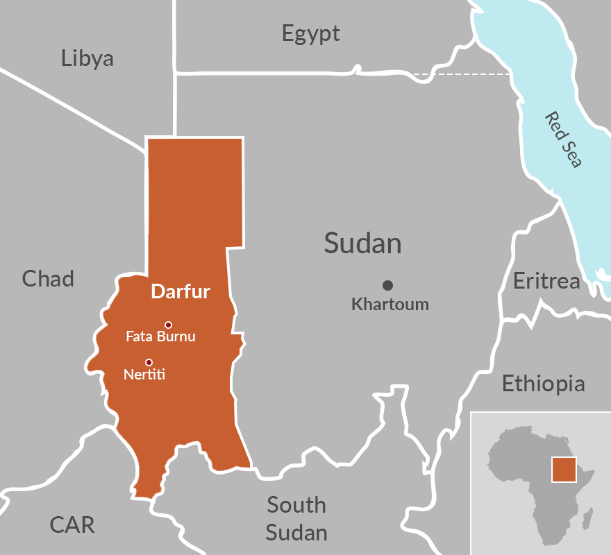Darfur Crisis: Humanitarian Emergency in Western Sudan

- 31 Jan 2025
Context:
Sudan’s Darfur region is once again in global focus following a deadly drone attack on the last functional hospital in El-Fasher, killing at least 67 people and injuring dozens. The International Criminal Court (ICC) has called for urgent UN Security Council intervention as the humanitarian situation deteriorates.
Geographical and Historical Background
- Location: Western Sudan, bordering Chad, Libya, Central African Republic, and South Sudan.
- Area: Approximately 493,000 sq. km, nearly the size of France.
- Topography: Predominantly arid and semi-arid terrain, with desert in the north and savanna in the south. Key physical features include:
- Jebel Marra Mountains: Volcanic highlands and key water source.
- Wadi Howar: Seasonal river vital for agriculture.
- Baggara Belt: Grazing zone, often contested.
- Historical Significance: Once an independent Islamic sultanate ruled by the Fur tribe, Darfur was annexed by Anglo-Egyptian Sudan in 1916. The name "Darfur" means "land of the Fur" in Arabic.
Ethnic Composition and Demographics
- Home to over 80 ethnic groups, including the Fur, Zaghawa, Beja, Nubians, and Arabs.
- Long-standing ethnic tensions exist between Arab nomadic groups and non-Arab farming communities, which have been a root cause of conflict.
Conflict Timeline and Key Actors
- Conflict Origins: Armed conflict began in 2003, led by rebel groups such as the Sudan Liberation Movement (SLM) and Justice and Equality Movement (JEM), demanding political autonomy and better representation.
- Government Response: The Sudanese government armed Janjaweed militias—now rebranded as the Rapid Support Forces (RSF)—who were accused of widespread atrocities, including genocide, mass killings, and rape.
- Recent Escalation:
- In 2023, violence surged amid civil war between Sudan's national army and RSF.
- RSF has seized much of Darfur and has besieged El-Fasher, capital of North Darfur, since May 2023.
- A January 2025 drone attack destroyed the Saudi Hospital in El-Fasher, killing 67 people. The hospital was one of the last with surgical capacity in the region.
Humanitarian Impact
- Health Crisis:
- 80% of healthcare facilities in Sudan are non-functional.
- Attacks on medical infrastructure have been rampant; El-Fasher’s Saudi Hospital was hit multiple times by suspected RSF drones.
- Displacement and Starvation:
- Over 12 million people displaced.
- Tens of thousands killed.
- Famine has already gripped camps like Zamzam, Abu Shouk, and Al-Salam, and is expected to spread to additional regions, including El-Fasher, by May 2025 (UN Assessment).
Global and Regional Implications
- The Darfur conflict has destabilized the region, affecting neighboring countries like Chad and the Central African Republic.
- ICC has issued warrants for several individuals including former President Omar al-Bashir, citing war crimes and crimes against humanity.
- The conflict highlights the intersection of climate stress, ethnic rivalries, political marginalization, and international accountability failures.
